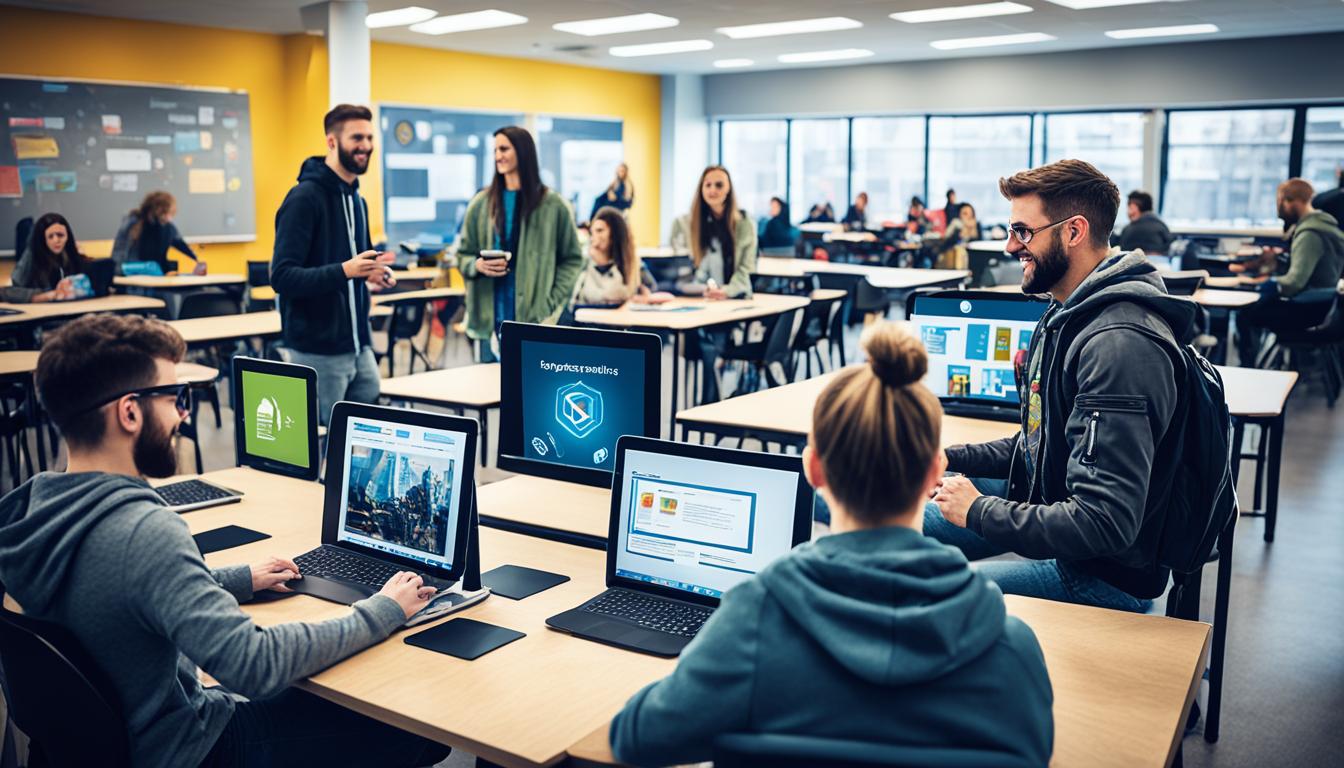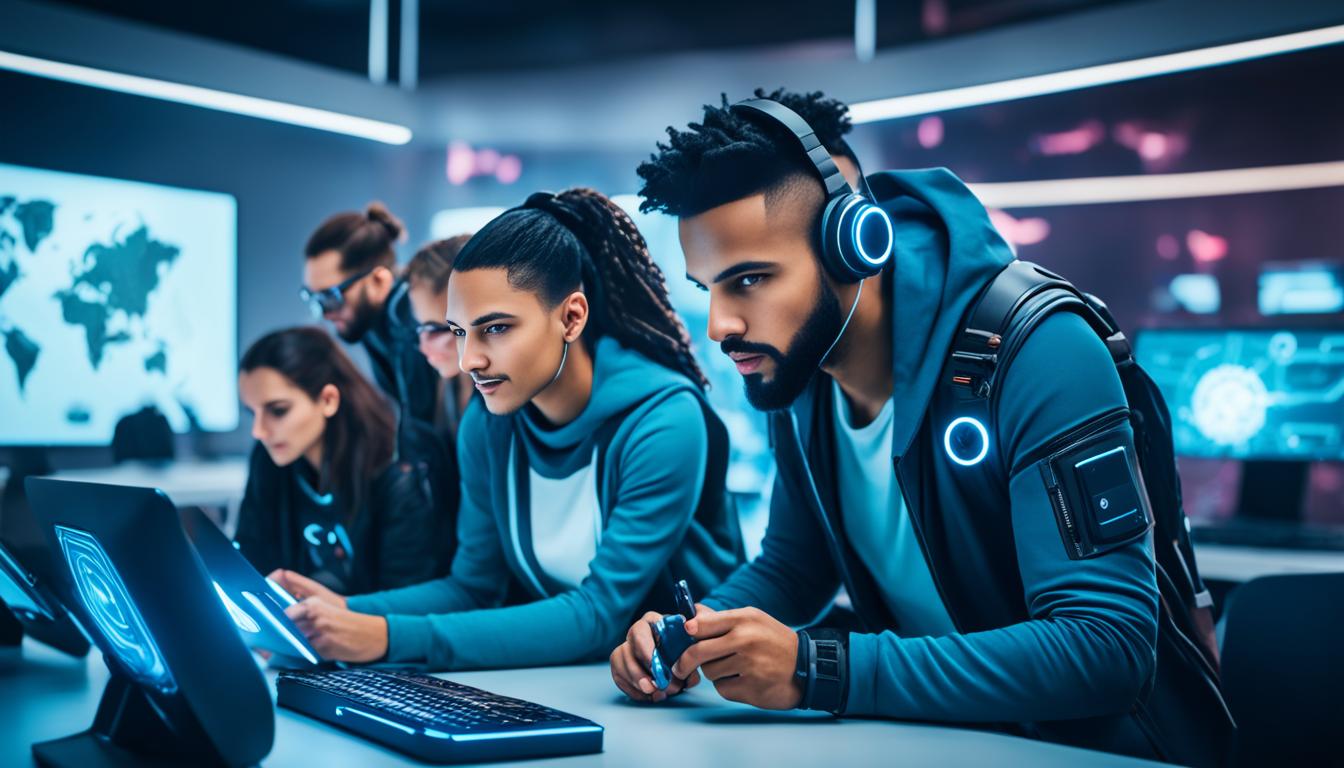
The world of education is rapidly evolving, and as we look ahead to the year 2025, it’s clear that traditional teaching methods are no longer sufficient to meet the needs of today’s digital native learners. According to the World Economic Forum, the education system must adapt to the changing landscape, catering to the unique learning patterns and preferences of the Gen-Z cohort, born between 1997 and 2012.
These tech-savvy students, who have grown up in a digital world, favor independent, visual, and kinesthetic learning approaches over passive, teacher-centered instruction and rote memorization. To effectively engage and educate this generation, educators must embrace a paradigm shift, incorporating innovative personalized learning, technology-enhanced education, project-based learning, social-emotional learning, collaborative learning, and a focus on developing critical thinking skills, a lifelong learning mindset, an interdisciplinary approach, and experiential learning.
Key Takeaways
- The education system must evolve to meet the needs of digital native learners in 2025.
- Traditional teaching methods focused on teacher-centered learning and memorization are no longer sufficient.
- Educators must understand and cater to the learning patterns of digital natives, who favor independent, visual, and kinesthetic approaches.
- Innovative educational approaches, such as personalized learning and technology-enhanced education, are essential for engaging and empowering digital native learners.
- Developing future-ready skills, including critical thinking, creativity, and digital literacy, is crucial for preparing digital natives for success in the 21st-century workforce.
Personalized Learning: Tailoring Education to Individual Needs
In the era of digital native learners, personalized learning has emerged as a crucial approach to meet the diverse needs of students. By leveraging the power of technology, educators can now create customized learning pathways that cater to the unique learning styles and preferences of each individual.
Adaptive Learning Technologies
Adaptive learning technologies, powered by artificial intelligence (AI), play a pivotal role in personalized learning. These innovative tools analyze individual student data, including their strengths, weaknesses, and learning patterns, to generate personalized learning plans. With real-time feedback and support, adaptive learning technologies empower students to progress at their own pace and achieve their full potential.
Project-Based and Experiential Learning
Alongside personalized learning approaches, project-based and experiential learning methods are gaining traction as effective ways to engage digital native learners. These hands-on, collaborative learning strategies encourage students to apply their knowledge to real-world scenarios, fostering creativity, critical thinking, and a deeper understanding of the subject matter.
By embracing personalized, project-based, and experiential learning approaches, educators can create a dynamic and engaging learning environment that caters to the unique needs of digital native students, preparing them for the challenges and opportunities of the 21st-century workforce.
Technology Integration: Enhancing the Learning Experience
As the digital landscape continues to evolve, the integration of advanced technologies is transforming the learning experience for digital native students. Two key areas where technology is making a significant impact are virtual and augmented reality (VR and AR), as well as online learning platforms and gamification.
Virtual and Augmented Reality in Education
The integration of VR and AR technologies has the potential to create truly immersive and engaging learning environments for digital native students. These cutting-edge tools can transport learners to virtual worlds, allowing them to explore, interact, and apply their knowledge in practical, hands-on scenarios. By leveraging the power of these immersive technologies, educators can foster deeper understanding, enhance knowledge retention, and enable students to develop essential skills for the 21st-century workforce.
Online Learning Platforms and Gamification
Another key aspect of technology integration in education is the use of online learning platforms and gamification. These digital tools can enhance the learning experience for digital native students by providing flexible, personalized, and engaging learning opportunities. Online platforms offer access to a vast array of educational resources, while gamification elements, such as interactive quizzes, simulations, and reward systems, can increase student motivation, promote active participation, and make the learning process more enjoyable and effective.

Developing Future-Ready Skills
In addition to technology integration and personalized learning approaches, the education system must also focus on developing the future-ready skills that digital native learners will need to succeed in the 21st-century workforce.
Critical Thinking and Problem-Solving
Cultivating critical thinking and problem-solving abilities is paramount in equipping digital native learners with the tools they need to navigate complex challenges and make informed decisions. These skills empower students to analyze information, think creatively, and devise innovative solutions to real-world problems.
Creativity and Innovation
Alongside critical thinking and problem-solving, nurturing creativity and innovation is crucial for preparing digital native learners for the ever-evolving demands of the future. By fostering an environment that encourages imagination, risk-taking, and out-of-the-box thinking, educators can help students develop the adaptability and entrepreneurial mindset required to thrive in the 21st-century workforce.
Digital Literacy and Computational Thinking
In the digital age, developing digital literacy and computational thinking skills is essential for preparing digital native learners for the future. Digital literacy encompasses not only technical skills but also the critical thinking and evaluation skills needed to navigate the vast amount of information available online. Computational thinking, on the other hand, helps students understand and solve complex problems using the power of technology.
Conclusion: Embracing a Paradigm Shift in Education
As the world rapidly evolves, it’s clear that the education system must also undergo a profound transformation to meet the needs of digital native learners. The traditional, teacher-centered model of education is no longer sufficient to prepare your students for the challenges and opportunities of the 21st century.
To effectively teach the tech-savvy, visually-inclined, and kinesthetically-driven digital natives, you must embrace a paradigm shift in education. This includes adopting personalized learning approaches powered by adaptive technologies, incorporating project-based and experiential learning methods, and seamlessly integrating advanced technologies like virtual and augmented reality into the classroom.
Moreover, developing future-ready skills such as critical thinking, problem-solving, creativity, innovation, digital literacy, and computational thinking is crucial for equipping your digital native learners with the tools they need to thrive in an ever-changing world. By fostering these essential competencies, you can empower your students to become adaptable, lifelong learners who are well-equipped to navigate the complexities of the future.
The path forward requires a bold, transformative approach to education – one that embraces the unique learning styles and preferences of digital natives. By embracing this paradigm shift, you can ensure that your students are prepared to lead, innovate, and succeed in the 21st-century global landscape.
FAQ
What are the new educational approaches needed for learners in 2025?
According to the World Economic Forum, the education system needs to evolve to meet the needs of digital natives, the Gen-Z cohort born between 1997-2012. Traditional teaching methods focused on teacher-centered learning and memorization are no longer sufficient for these tech-savvy students. To effectively teach digital natives, educators must understand their learning patterns, which favor independent, visual, and kinesthetic approaches over passive learning.
How can personalized learning help meet the diverse needs of digital native learners?
Personalized learning is emerging as a crucial approach to meet the diverse needs of digital native learners. Adaptive learning technologies powered by artificial intelligence (AI) can analyze individual student data to create customized learning pathways and provide real-time feedback and support.
What are the benefits of project-based and experiential learning for digital native students?
In addition to personalized learning, project-based and experiential learning approaches are gaining traction as effective ways to engage digital native learners. These methods encourage active collaboration, creativity, and the application of knowledge to real-world scenarios.
How are advanced technologies transforming the learning experience for digital native students?
The integration of advanced technologies, such as virtual and augmented reality (VR and AR), is transforming the learning experience for digital native students. These immersive technologies can create engaging, interactive environments that foster deeper understanding and enable students to apply their knowledge in practical, hands-on scenarios.
What role do online learning platforms and gamification play in enhancing the learning experience for digital native students?
Another key aspect of technology integration in education is the use of online learning platforms and gamification. These tools can enhance the learning experience for digital native students by providing flexible, personalized, and engaging learning opportunities.
What future-ready skills are crucial for digital native learners to develop?
In addition to technology integration and personalized learning approaches, the education system must also focus on developing the future-ready skills that digital native learners will need to succeed in the 21st-century workforce. Alongside critical thinking and problem-solving, cultivating creativity and innovation is crucial for equipping digital native learners with the skills they need to thrive in an ever-evolving world. Developing digital literacy and computational thinking skills is also essential for preparing digital native learners for the future.
